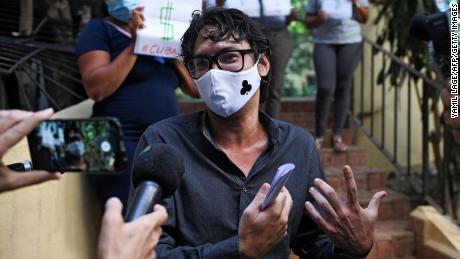Cuba is cracking down on critics. This unlikely dissident says he’ll protest anyway

But Cuban officials are increasingly taking aim at Yunior Garcia Aguilera and his proposal to hold a peaceful political march later this month — for which the state has already denied permission.”Cubans have spent too much time in silence,” Garcia Aguilera said during an interview in his cramped apartment in the downtrodden San Agustín neighborhood of Havana. “It’s time to open our mouths with liberty and say what we think.”Garcia Aguilera is not the typical anti-government Cuban dissident. He has worked for years in state-run theater and television productions, is critical of the US embargo on the island and says he is more liberal than Cuba’s “conservative” leadership. Cuban state-run media this week compared him to renowned Czech playwright and human rights advocate Vaclav Havel, although the description was not meant as a compliment.His planned march is intended to call for In support of his plan to protest, Garcia Aguilera formed a group called Archipelago, which has over 31,000 followers on Facebook. Group members say they too are harassed for their activism, and complain of being followed by plainclothes state security agents and receiving threats by government officials. Members also accuse Cuba’s state telecom provider of preventing Cubans from texting the word archipelago in Spanish or the date of their planned protest — a long-established censorship tactic on the island. CNN has independently confirmed the messaging block.In October, Garcia Aguilera posted pictures on social media of the carcass and blood and feathers of a dead bird that were spread across the entrance to his apartment in the middle of the night — a gory scene that he understood as a warning to halt his activism. He blamed the government for the vandalism, saying that police monitoring his house would have been aware of who was responsible. Cuban officials have not responded to his allegations of harassment.On Monday, Garcia Aguilera’s wife also filmed neighbors carrying out a nighttime “acto de repudio” or “act of repudiation” — chanting government slogans at the couple’s doorstep and “warning” him to stop his activism.Nevertheless, Garcia Aguilera and a handful of other protest organizers say they are intent on moving forward with their planned march. They say they want peaceful protesters arrested after demonstrations on July 11 to be released, more guarantees for individual freedoms and a lifting of official censorship.A dangerous time to protestSpeaking out against the island’s communist-run government carries even greater risks than usual, after the state was rattled by widespread protests in July, increased US economic sanctions and the implosion of their tourism industry Garcia Aguilera has since moved the proposed march from November 20 to November 15, although the Cuban government is unlikely to allow protestors to take part regardless of the date. He said the government’s overreaction to his proposed march has only proven his point. “They have shown there’s no rule of law,” he said. “There’s no possibility for citizens to legally, peacefully and orderly show their dissent to those power.”With so much tension in the air, it’s unclear how many Cubans will join Garcia Aguilera’s call to protest but already the initiative threatens to further deteriorate frayed US and Cuban relations.”The Cuban regime is failing to meet the people’s most basic needs. That includes food. That includes medicine. Now is a chance to listen to the Cuban people and to make a positive change,” State Department spokesman Ned Price said In October.The Biden administration has warned the Cuban government that if it prevents the march from taking take place, the island could face further economic sanctions.



